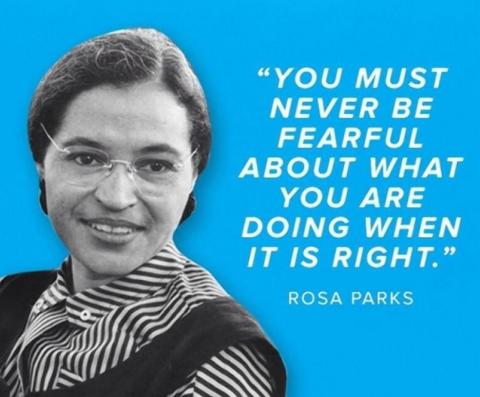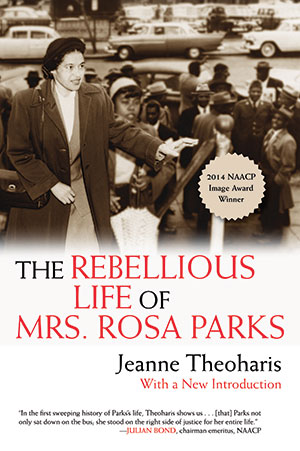Sixty years ago, Rosa Parks refused to give up her seat on a bus in Montgomery, Ala. Her courageous act is now American legend. She is a staple of elementary school curricula and was the second-most popular historical figure named by American students in a survey. When Republican presidential contenders were asked to pick a woman they wanted pictured on the $10 bill, the largest number of votes went to Parks.
Americans are convinced they know this civil rights hero. In textbooks and documentaries, she is the meek seamstress gazing quietly out of a bus window - a symbol of progress and how far we've come. When she died in 2005, the word "quiet" was used in most of her obituaries and eulogies. We have grown comfortable with the Parks who is often seen but rarely heard.
That image of Parks has stripped her of political substance. Her "life history of being rebellious," as she put it, comes through decisively in the recently opened Rosa Parks Collection at the Library of Congress. It features previously unseen personal writings, letters, speech notes, financial and medical records, political documents, and decades of photographs.
There, we see a lifelong activist who had been challenging white supremacy for decades before she became the famous catalyst for the Montgomery bus boycott. We see a woman who, from her youth, didn't hesitate to indict the system of oppression around her. As she once wrote, "I talked and talked of everything I know about the white man's inhuman treatment of the negro."
Parks was a seasoned freedom fighter who had grown up in a family that supported Marcus Garvey and who married an activist for the Scottsboro boys. She joined the Montgomery chapter of the NAACP in 1943, becoming branch secretary. She spent the next decade pushing for voter registration, seeking justice for black victims of white brutality and sexual violence, supporting wrongfully accused black men, and pressing for desegregation of schools and public spaces. Committed to both the power of organized nonviolent direct action and the moral right of self defense, she called Malcolm X her personal hero.
The Rosa Parks Collection, which opened in February, reveals how broadly Parks has been distorted and misunderstood. Her papers languished unseen for years following her death because of disputes over her estate, the hefty price the auction house put on the archives, and its refusal to allow any scholars to assess the papers before the sale. Last year, the Howard Buffett Foundation bought the archive and gave it to the Library of Congress on 10-year loan.
Though Parks later wrote an autobiography, her notes from decades earlier give a more personal sense of her thoughts. In numerous accounts, she highlighted the difficulty of navigating a segregated society and the immense pressure put on black people not to dissent. She wrote that it took a "major mental acrobatic feat" to survive as a black person in the United States. Highlighting that it was "not easy to remain rational and normal mentally in such a setting," she refused to normalize the ability to function under American racism.
For her, the frustration began in childhood, when even her beloved grandmother worried about her "talking biggety to white folks." She recounts how her grandmother grew angry when a young Rosa recounted picking up a brick to challenge a white bully. Rosa told her grandmother: "I would rather be lynched than live to be mistreated and not be allowed to say `I don't like it.' "
Parks viewed the power of speaking back in the face of racism and oppression as fundamental - and saw that denying that right was key to the functioning of white power. Parks's "determination never to accept it, even if it must be endured," led her to "search for a way of working for freedom and first class citizenship."
Parks carried that determination into adulthood, though she made clear the impossible mental state it required. She lyrically described the difficulty of being a rebel, the ways black children were "conditioned early to learn their places," and the toll it took on her personally: "There is just so much hurt, disappointment and oppression one can take.. The line between reason and madness grows thinner."
In the longest piece of the collection, an 11-page document describing a near-rape incident, Parks decisively uses the power of speaking back. When the document became public in 2011, there was controversy around its release and questions about whether it was a work of fiction. But it does not appear that Parks wrote fiction, and details of the story correspond to Parks's life. Like the narrator of the story, Parks was doing domestic work during the Scottsboro trial, during her late teens in 1931. It's written in the first person, though the narrator is unnamed.
In the account, a young Rosa is threatened with assault by a white neighbor of her employer, who was let into the house by a black worker, "Sam." The heavy-set white man she aptly called "Mr. Charlie" (a term black people of the era used for white people and their arbitrary power) gets a drink, puts his hand on her waist, and attempts to make a move on her.
Furious and terrified, she resolved to resist: "I was ready and willing to die, but give any consent, never, never, never." When Mr. Charlie said he'd gotten permission from Sam to be with her, she replied that Sam didn't own her, that she hated the both of them, and that nothing Mr. Charlie could do would get her consent. "If he wanted to kill me and rape a dead body," Parks wrote, "he was welcome but he would have to kill me first."
It is significant that Parks's philosophy of resistance is framed through an experience of sexual aggression. She was committed to women's rights throughout her life - from working to get justice for black women who had been raped, such as Gertrude Perkins and Recy Taylor, to defending the rights of women prisoners. When Joan Little, a 20-year-old black woman serving a seven-year sentence for robbery, killed a white guard who sexually assaulted her, Parks co-founded Detroit's Joan Little Defense Committee. Little was acquitted, becoming the first woman in U.S. history to successfully use self-defense against sexual assault in a homicide case.
Parks used this power of speaking back again on the evening of Dec. 1, 1955, when bus driver James Blake ordered her to give up her seat to a white passenger and she refused. Blake chose not simply to evict her from the bus, as he had done in the past, but to have her arrested. Calling attention to the larger power in the system, Parks questioned the arresting officers, "Why do you push us around?" One officer answered, "I don't know, but the law is the law and you're under arrest."
After years of activism, Parks had reached her breaking point on the bus that December evening: "I had been pushed around all my life and felt at this moment that I couldn't take it any more." Her writings reveal the burden that this decade of political activism - which, with a small cadre of other Montgomery NAACP members, had produced little change - had been on her spirit. Describing the "dark closet of my mind," she wrote about the loneliness of being a rebel: "I am nothing. I belong nowhere."
Repeatedly in her writings, Parks underscored the difficulties in mobilizing in the years before her bus protest: "People blamed NAACP for not winning cases when they did not support it and give strength enough." She found it demoralizing, if understandable, that in the decade before the boycott, "the masses seemed not to put forth too much effort to struggle against the status quo," noting how those who challenged the racial order like she did were labeled "radicals, sore heads, agitators, trouble makers." Indeed, Rosa Parks was red-baited and received death threats and hate mail for years in Montgomery and in Detroit for her movement work.
Though the righteousness of her actions may seem self-evident today, at the time, those who challenged segregation - like those who challenge racial injustice today - were often treated as unstable, unruly and potentially dangerous by many white people and some black people. Her writings show how she struggled with feeling isolated and crazy, before and even during the boycott. In one piece of writing, she explained how she felt "completely alone and desolate as if I was descending in a black and bottomless chasm."
Despite the boycott's successful end, the Parks family still faced death threats and could not find steady work. In August 1957, they left Montgomery for Detroit, where her brother and cousins lived - "the promised land that wasn't," as she called it. There, in Detroit, she remained active in various movements for racial, social, criminal and global justice in the decades to come. Mountains of fliers, programs, letters, mailings, meeting agendas and conference programs document the span of her political activism there - though very few writings have survived in her personal papers from these later years.
The few that remain tell us that her radicalism never weakened. "Freedom fighters never retire," she noted in a testimonial for a fellow activist. As she had for decades, Parks drew sustenance from the militancy and spirit of young people, working in and alongside the growing Black Power movement. Understanding the impact that years of activism with limited results can have on a person, she continued calling for rapid and radical change. In a 1973 letter posted at the Afro-American Museum in Detroit, she noted the impact that years of white violence and intransigence had on the younger generation:
The attempt to solve our racial problems nonviolently was discredited in the eyes of many by the hard core segregationists who met peaceful demonstrations with countless acts of violence and bloodshed. Time is running out for a peaceful solution. It may even be too late to save our society from total destruction.
Writing this after what many mark as the successful end of the modern civil rights movement, Parks clearly believed that the struggle was not over. In the 1970s, '80s and '90s, she continued to press for change in the criminal justice system, in school and housing inequality, in jobs and welfare policy and in foreign policy. She worked in U.S. Rep. John Conyers's office and spoke out against Clarence Thomas's nomination to the Supreme Court, dismayed by his poor record on civil rights. Sometime in the 1990s, an older Parks doodled on a paper bag (preserved in the collection): "The Struggle Continues.. The Struggle Continues.. The Struggle Continues."
Much of the memorializing of the Montgomery bus boycott and the civil rights movement misses this side of Parks. Instead, we've become content to celebrate her "quiet" bus protest as a historic triumph in a movement that has long since run its course. But listening to Rosa Parks forces us to reconsider our view not only of our civil rights history, but also the demands of our civil rights present. We are forced to reckon with the fact that today's rebels could be tomorrow's heroes.
[Jeanne Theoharis is a distinguished professor of political science at the Brooklyn College of the City University of New York and author of the award-winning "The Rebellious Life of Mrs. Rosa Parks."]



Spread the word